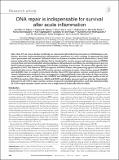DNA repair is indispensable for survival after acute inflammation
Author(s)
Calvo, Jennifer A.; Meira, Lisiane B.; Lee, Chun-Yue I.; Moroski-Erkul, Catherine A.; Abolhassani, Nona; Taghizadeh, Koli; Eichinger, Lindsey Wood; Muthupalani, Sureshkumar; Nordstrand, Line M.; Klungland, Arne; Samson, Leona D.; ... Show more Show less
DownloadSamson_DNA repair indispensable.pdf (2.098Mb)
PUBLISHER_POLICY
Publisher Policy
Article is made available in accordance with the publisher's policy and may be subject to US copyright law. Please refer to the publisher's site for terms of use.
Terms of use
Metadata
Show full item recordAbstract
More than 15% of cancer deaths worldwide are associated with underlying infections or inflammatory conditions, therefore understanding how inflammation contributes to cancer etiology is important for both cancer prevention and treatment. Inflamed tissues are known to harbor elevated etheno-base (ε-base) DNA lesions induced by the lipid peroxidation that is stimulated by reactive oxygen and nitrogen species (RONS) released from activated neutrophils and macrophages. Inflammation contributes to carcinogenesis in part via RONS-induced cytotoxic and mutagenic DNA lesions, including ε-base lesions. The mouse alkyl adenine DNA glycosylase (AAG, also known as MPG) recognizes such base lesions, thus protecting against inflammation-associated colon cancer. Two other DNA repair enzymes are known to repair ε-base lesions, namely ALKBH2 and ALKBH3; thus, we sought to determine whether these DNA dioxygenase enzymes could protect against chronic inflammation-mediated colon carcinogenesis. Using established chemically induced colitis and colon cancer models in mice, we show here that ALKBH2 and ALKBH3 provide cancer protection similar to that of the DNA glycosylase AAG. Moreover, Alkbh2 and Alkbh3 each display apparent epistasis with Aag. Surprisingly, deficiency in all 3 DNA repair enzymes confers a massively synergistic phenotype, such that animals lacking all 3 DNA repair enzymes cannot survive even a single bout of chemically induced colitis.
Date issued
2012-06Department
Massachusetts Institute of Technology. Center for Environmental Health Sciences; Massachusetts Institute of Technology. Department of Biological Engineering; Massachusetts Institute of Technology. Department of Biology; Massachusetts Institute of Technology. Department of Chemical Engineering; Massachusetts Institute of Technology. Division of Comparative Medicine; Koch Institute for Integrative Cancer Research at MITJournal
Journal of Clinical Investigation
Publisher
American Society for Clinical Investigation
Citation
Calvo, Jennifer A. et al. “DNA Repair Is Indispensable for Survival After Acute Inflammation.” Journal of Clinical Investigation 122.7 (2012): 2680–2689. Web. © 2012 American Society for Clinical Investigation.
Version: Final published version
ISSN
0021-9738
1558-8238